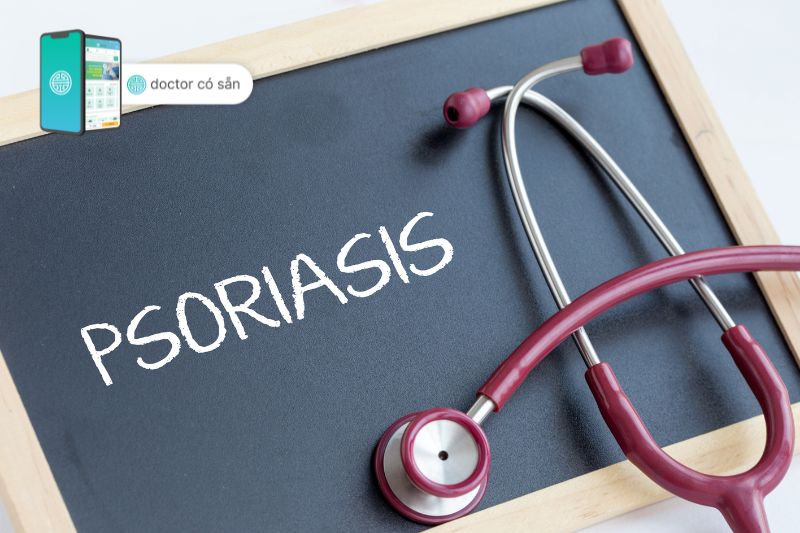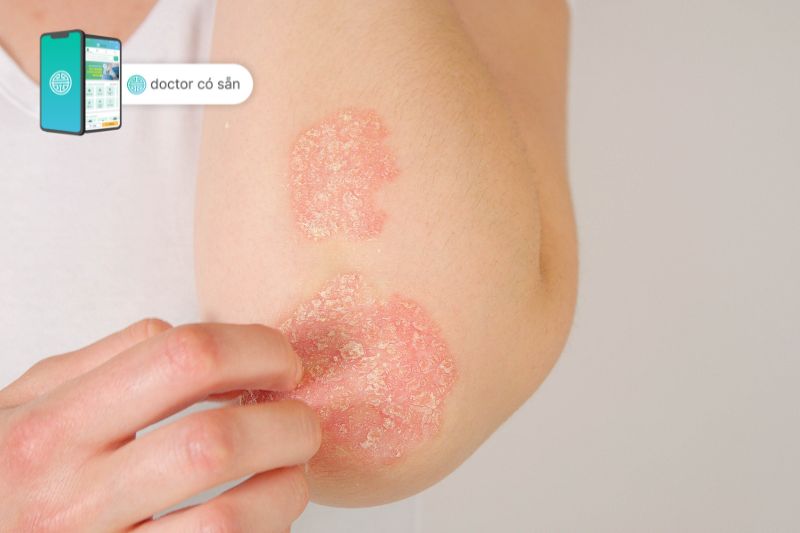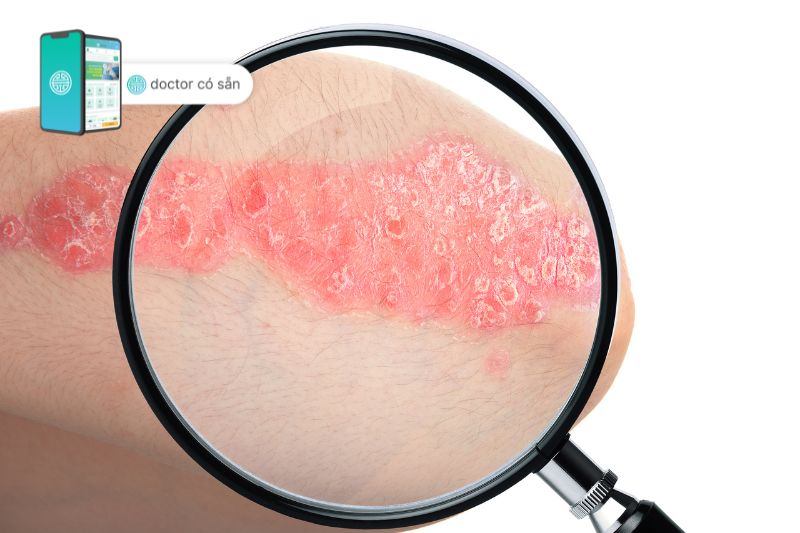Psoriasis is a chronic skin condition that affects millions of people worldwide. It is characterized by red, itchy, and scaly patches on the skin. While psoriasis is a common condition, many individuals are still unaware of what it entails and how it can impact their lives. In this article, we will delve into the causes, symptoms, and treatment of psoriasis, shedding light on this often-misunderstood condition.

Tóm tắt nội dung
What is psoriasis?
Defining psoriasis
Psoriasis is a chronic autoimmune disease that primarily affects the skin. It occurs when the immune system mistakenly attacks healthy skin cells, causing them to multiply rapidly. This accelerated cell production leads to the build-up of thick, scaly patches known as plaques. These patches can appear anywhere on the body, but they are commonly found on the elbows, knees, scalp, and lower back.
Psoriasis is not just a superficial skin condition; it goes much deeper than that. It is a complex disease that can have a significant impact on a person’s overall well-being. Beyond the physical symptoms, such as redness, itching, and pain, psoriasis can also cause emotional and psychological distress. Many individuals with psoriasis experience feelings of self-consciousness, embarrassment, and even depression due to the visible nature of the condition.

Common misconceptions about psoriasis
There are several misconceptions surrounding psoriasis. Firstly, it is not a contagious condition, so you cannot contract it from someone else. Psoriasis is not caused by poor hygiene or any external factors; it is an internal autoimmune disorder. Understanding this can help reduce the stigma and fear associated with the condition.
Another common misconception is that psoriasis is merely a dermatological issue. While it primarily affects the skin, psoriasis is a multifaceted condition that can have profound physical, emotional, and psychological effects on individuals. The chronic nature of psoriasis means that those living with the condition often face a lifetime of managing symptoms, seeking treatment, and coping with the impact it has on their daily lives.
It is important to dispel these misconceptions and increase awareness about psoriasis. By understanding the true nature of the disease, we can foster empathy and support for those living with psoriasis and work towards better treatment options and improved quality of life for affected individuals.
Psoriasis causes
Psoriasis is a chronic autoimmune disease that affects the skin, causing red, scaly patches to develop. While the exact cause of psoriasis is still not fully understood, researchers have identified several factors that contribute to its development and flare-ups.
Genetic factors
Research suggests that genetics play a significant role in the development of psoriasis. Individuals with a family history of the condition are more likely to develop it themselves. Scientists have identified certain genes associated with psoriasis, such as the HLA-C gene, which plays a crucial role in regulating the immune system. However, it is important to note that having these genes does not guarantee the development of psoriasis, as other factors also come into play.
Furthermore, the precise mechanisms by which these genes contribute to the development of the disease are still being explored. It is believed that these genes may affect the immune system’s response to environmental triggers, leading to the characteristic inflammation and rapid skin cell turnover seen in psoriasis.
Environmental triggers
While genetics lay the groundwork for psoriasis, environmental triggers can exacerbate or provoke flare-ups. These triggers can vary from person to person, making it important for individuals with psoriasis to identify and manage their specific triggers.
Stress is a common trigger for many individuals with psoriasis. Emotional stress can disrupt the immune system and increase inflammation, leading to flare-ups. In addition to stress, certain infections, such as strep throat or respiratory infections, have been known to trigger psoriasis symptoms. The body’s immune response to these infections can cause an overactive immune response, leading to the development or worsening of psoriasis.
Some medications, such as lithium, antimalarial drugs, and beta-blockers, have also been associated with triggering psoriasis in certain individuals. These medications can disrupt the immune system or cause inflammation, leading to the development of psoriasis symptoms.
Climate and weather conditions can also play a role in triggering psoriasis flare-ups. Cold and dry weather, for example, can cause the skin to become dry and more prone to irritation, leading to the development of psoriasis patches. On the other hand, hot and humid weather can increase sweating, which can also irritate the skin and trigger flare-ups.
Understanding and managing these triggers is crucial in effectively treating and controlling the condition. By avoiding or minimizing exposure to triggers, individuals with psoriasis can help reduce the frequency and severity of flare-ups.
If you’re unsure about the causes of psoriasis, consulting a doctor can guide you towards effective treatment.

Recognizing the symptoms of psoriasis
Psoriasis is a chronic autoimmune condition that affects the skin, causing red, inflamed patches covered with silvery scales. While the physical signs of psoriasis can vary from person to person, there are common symptoms that can help in recognizing the condition.
Physical signs of psoriasis
One of the most recognizable physical signs of psoriasis is the presence of red, inflamed patches of skin. These patches can appear anywhere on the body, but they are commonly found on the elbows, knees, scalp, and lower back. The affected areas are often covered with silvery scales, giving them a distinct appearance.
Psoriasis patches can be itchy and painful, causing discomfort and irritation. In some severe cases, the skin can crack and bleed, leading to further complications. Additionally, individuals with psoriasis may experience nail changes, such as pitting or separation from the nail bed. These nail symptoms can be another indicator of the condition.
Emotional and psychological impact
Living with psoriasis can have a significant impact on an individual’s emotional and psychological well-being. The visible nature of the condition can lead to feelings of self-consciousness, embarrassment, and low self-esteem. Many individuals with psoriasis may avoid social situations or activities that expose their affected skin, further isolating themselves.
It is not uncommon for people with psoriasis to experience anxiety and depression as a result of their condition. The constant worry about flare-ups, the impact on their appearance, and the potential judgment from others can take a toll on their mental health. It is essential for individuals with psoriasis to seek support from healthcare professionals, support groups, or therapists who can provide guidance and help manage the emotional and psychological impact of the condition.
Furthermore, it is worth noting that psoriasis is not contagious, but misconceptions and misunderstandings about the condition can lead to social stigma and discrimination. Education and awareness about psoriasis are crucial in fostering understanding and empathy among the general population.
In conclusion, recognizing the physical signs of psoriasis, such as red, inflamed patches covered with silvery scales, and understanding the emotional and psychological impact it can have on individuals is essential. By increasing awareness and providing support, we can create a more inclusive and supportive environment for those living with psoriasis.
Different types of psoriasis
Psoriasis is a chronic autoimmune condition that affects the skin, causing red, inflamed patches covered with silvery scales. While there are several types of psoriasis, each with its own unique characteristics, all forms of the condition can cause significant discomfort and impact a person’s quality of life.
Plaque psoriasis
Plaque psoriasis is the most common form, accounting for about 80% of cases. It is characterized by raised, inflamed patches covered with silvery scales. These plaques can vary in size and severity, causing significant discomfort and itchiness. Plaque psoriasis commonly affects the elbows, knees, scalp, and lower back, but it can appear anywhere on the body.
Living with plaque psoriasis can be challenging, as the visible nature of the condition can lead to self-consciousness and social stigma. In addition to physical symptoms, individuals with plaque psoriasis may also experience emotional distress, such as anxiety and depression.
Guttate psoriasis
Guttate psoriasis typically appears as small, red spots on the skin. It is often triggered by an infection, such as strep throat. Guttate psoriasis is more common in children and young adults and can resolve on its own or progress into other forms of psoriasis.
While guttate psoriasis may not cover large areas of the body like plaque psoriasis, the numerous small spots can still cause discomfort and itchiness. The condition can also be associated with a sore throat, fever, and general malaise.
Inverse psoriasis
Inverse psoriasis mainly affects skin folds, such as the armpits, groin, and under the breasts. It manifests as smooth, red patches that can be worsened by friction and sweat. Inverse psoriasis can be particularly uncomfortable due to the sensitivity of the affected areas.
Living with inverse psoriasis can be challenging, as the constant friction and moisture in skin folds can exacerbate the symptoms. The condition can also cause significant discomfort and impact a person’s mobility and daily activities.
Pustular psoriasis
Pustular psoriasis is characterized by pus-filled blisters on the skin. These blisters can appear on localized areas or spread across the body. Pustular psoriasis can be triggered by certain medications, infections, or stress. It requires prompt medical attention.
Living with pustular psoriasis can be extremely challenging, as the blisters can be painful and may lead to complications such as infection. The condition can also cause flu-like symptoms, such as fever, chills, and fatigue.
Erythrodermic psoriasis
Erythrodermic psoriasis is a severe and rare form of the condition. It affects most of the body, causing redness, itching, and pain. This type of psoriasis can disrupt the body’s temperature regulation and fluid balance, requiring immediate medical intervention.
Living with erythrodermic psoriasis can be incredibly distressing, as the condition can cause intense discomfort and impact a person’s ability to carry out daily activities. The skin may become extremely dry and prone to cracking, increasing the risk of infection.
Understanding the different types of psoriasis is crucial in determining the most appropriate treatment plan for individuals. It is important for individuals with psoriasis to work closely with healthcare professionals to manage their condition effectively and improve their quality of life.
Treatment options for psoriasis
While there is currently no cure for psoriasis, various treatment options can effectively manage the symptoms and improve the quality of life for individuals with the condition. Treatment plans are tailored to each person’s unique needs and may include topical treatments, phototherapy, systemic medications, or a combination of these approaches. It is essential for individuals with psoriasis to work closely with healthcare professionals to find the most suitable treatment plan and actively manage the condition.
Where can you find treatment for psoriasis?
Dr. Michael’s Psoriasis & Skin Clinic is a leader in dermatology, specializing in challenging skin conditions. Their mission centers on effectively managing Psoriasis, Eczema, Vitiligo, and Fungal Skin Diseases.
Their success is thanks to Dr. Michael Tirant, PhD, and his 30-year journey refining “Dr. Michael’s method,” backed by top dermatology professors. These standards are internationally recognized, influencing healthcare systems worldwide.
They prioritize safety and efficacy, using the finest natural herbs in line with Dr. Michael’s method. Their treatments, validated by a decade of clinical trials across multiple countries, achieve up to a remarkable 90% effectiveness, even for children and mothers.
Book today to discover the realm of exceptional skin care at Dr. Michael’s Psoriasis & Skin Clinic.

FQAs
Is psoriasis contagious?
No, psoriasis is not contagious. It cannot be spread through physical contact with someone who has the condition.
Can psoriasis be cured?
Psoriasis is a chronic condition, and there is no known cure. However, various treatments can help manage and alleviate the symptoms.
How can I manage psoriasis flare-ups?
Lifestyle changes like maintaining a healthy diet, avoiding triggers, managing stress, and keeping the skin moisturized can help reduce the frequency and severity of flare-ups.
Can psoriasis affect other parts of the body besides the skin?
Yes, psoriasis can affect nails (psoriatic nail disease) and joints (psoriatic arthritis). Some individuals with psoriasis may also experience other health issues like cardiovascular problems.
Is there a link between psoriasis and other medical conditions?
Psoriasis has been associated with an increased risk of certain conditions such as diabetes, heart disease, and depression. Regular medical check-ups are important for those with psoriasis.
Can children develop psoriasis?
Yes, psoriasis can affect people of all ages, including children. Pediatric psoriasis may have slightly different characteristics and treatment approaches.
In conclusion, psoriasis is a complex condition that encompasses more than just physical symptoms. By understanding the causes, recognizing the symptoms, and exploring the different treatment options, individuals can better navigate their psoriasis journey. Seeking support and guidance from healthcare professionals and connecting with others who share similar experiences can also be invaluable. With the right knowledge and resources, individuals with psoriasis can lead fulfilling lives while managing their condition effectively.












